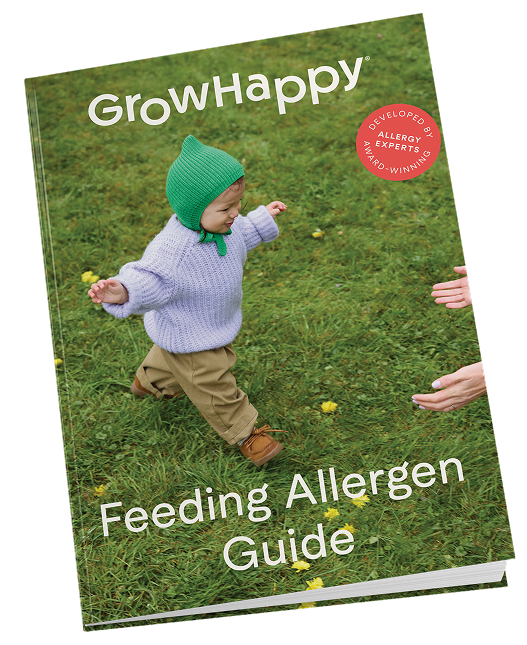Early & Often™
GrowHappy's Professor George du Toit and his colleagues showed in the landmark LEAP (2015) and EAT-On studies that we need to teach the immune system to accept food allergens while the immune system is still developing by feeding allergens Early & Often™. Rather than delaying introduction and giving the immune system more opportunities to become allergic, we now know that Early and Often™ is the way to go. Feeding allergens down the GI tract regularly from 4 months old allows us to tolerize the gut and teach the body that food is safe, that food is not dangerous. This study was revolutionary as it reversed prior hypothesis and is a guiding force for us all over the world to this day.
“The LEAP parents who fed 2g of peanut protein consistently from 4-11 months of age to their baby who had an egg allergy and/or eczema (making him or her at more risk) reduced their child's risk of developing a peanut allergy by 80%! The EAT-On studies, in less atopic infants, also demonstrated eating allergens Early & Often had protective effects.” -- Professor George du Toit
https://pubmed.ncbi.nlm.nih.gov/25705822/
https://pubmed.ncbi.nlm.nih.gov/29909054/
On the back of the LEAP, EAT and other studies, guidelines changed around the world.
USDA (United States Department of Agriculture) recommends introducing potentially allergenic foods (e.g., peanuts, egg, cow milk products, tree nuts, wheat, shellfish, fish, and soy) when other complementary foods are introduced to an infant’s diet.
The AAP (American Academy of Pediatrics) supports that we should not delay the introduction of allergenic foods once the baby is eating.
The three top allergy organizations in the US and Canada (AAAAI, ACAAI, CSACI) worked together to form a consensus report (which our Professors David Fleischer and Carina Venter were authors of) with recommendations for the medical community and parents to address the rise in food allergies. Here are key takeaways from the report:
-
Feed allergens early: “Peanut and egg should be introduced around 6 months of life, but not before 4 months.”
- Maternal exclusion of allergens not recommended: “Maternal exclusion of common allergens during pregnancy and/or lactation as a means to prevent food allergy is not recommended.”
-
Diet diversity: Upon introducing complementary foods, infants should be fed a diverse diet, as this may help foster food freedom
-
Breastfeeding: “Although exclusive breast-feeding is universally recommended for all mothers, there is no specific association between exclusive breastfeeding and the primary prevention of any specific food allergy.”
Before your baby turns 1 is the safest time to get started
Research shows that before your baby turns 1 is the safest time to feed them common allergy-causing foods.
-
Babies less than 1 have the fewest severe allergic reactions of any age group. The severity of allergic reactions increases as the child gets older.
-
Severe food allergic reactions and mortality...are particularly low in infants, with no food allergy deaths ever reported in infants under age 1.
-
Allergic reactions get more severe as your baby gets older, so starting as early as possible is the safest way to feed allergens to your baby
https://www.jacionline.org/article/S0091-6749(19)31863-9/fulltext









